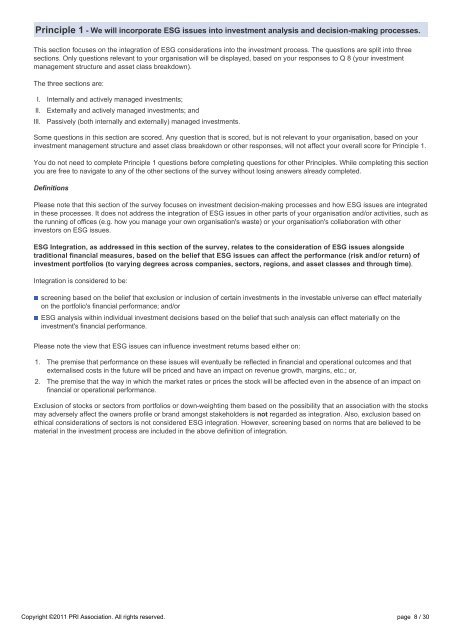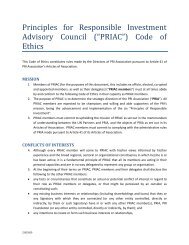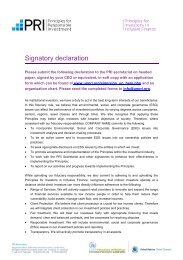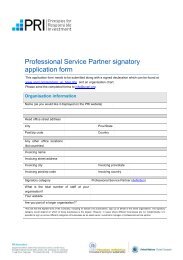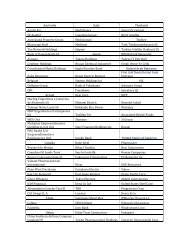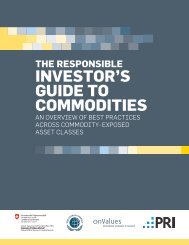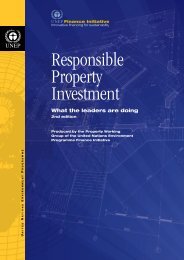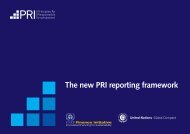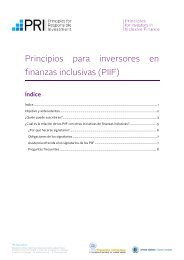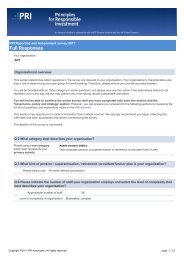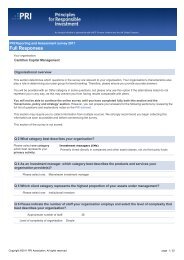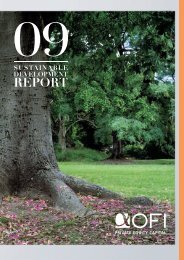Aviva Investors - Principles for Responsible Investment
Aviva Investors - Principles for Responsible Investment
Aviva Investors - Principles for Responsible Investment
You also want an ePaper? Increase the reach of your titles
YUMPU automatically turns print PDFs into web optimized ePapers that Google loves.
Principle 1 We will incorporate ESG issues into investment analysis and decisionmaking processes.<br />
This section focuses on the integration of ESG considerations into the investment process. The questions are split into three<br />
sections. Only questions relevant to your organisation will be displayed, based on your responses to Q 8 (your investment<br />
management structure and asset class breakdown).<br />
The three sections are:<br />
I. Internally and actively managed investments;<br />
II.<br />
III.<br />
Externally and actively managed investments; and<br />
Passively (both internally and externally) managed investments.<br />
Some questions in this section are scored. Any question that is scored, but is not relevant to your organisation, based on your<br />
investment management structure and asset class breakdown or other responses, will not affect your overall score <strong>for</strong> Principle 1.<br />
You do not need to complete Principle 1 questions be<strong>for</strong>e completing questions <strong>for</strong> other <strong>Principles</strong>. While completing this section<br />
you are free to navigate to any of the other sections of the survey without losing answers already completed.<br />
Definitions<br />
Please note that this section of the survey focuses on investment decisionmaking processes and how ESG issues are integrated<br />
in these processes. It does not address the integration of ESG issues in other parts of your organisation and/or activities, such as<br />
the running of offices (e.g. how you manage your own organisation's waste) or your organisation's collaboration with other<br />
investors on ESG issues.<br />
ESG Integration, as addressed in this section of the survey, relates to the consideration of ESG issues alongside<br />
traditional financial measures, based on the belief that ESG issues can affect the per<strong>for</strong>mance (risk and/or return) of<br />
investment portfolios (to varying degrees across companies, sectors, regions, and asset classes and through time).<br />
Integration is considered to be:<br />
screening based on the belief that exclusion or inclusion of certain investments in the investable universe can effect materially<br />
on the portfolio's financial per<strong>for</strong>mance; and/or<br />
ESG analysis within individual investment decisions based on the belief that such analysis can effect materially on the<br />
investment's financial per<strong>for</strong>mance.<br />
Please note the view that ESG issues can influence investment returns based either on:<br />
1. The premise that per<strong>for</strong>mance on these issues will eventually be reflected in financial and operational outcomes and that<br />
externalised costs in the future will be priced and have an impact on revenue growth, margins, etc.; or,<br />
2. The premise that the way in which the market rates or prices the stock will be affected even in the absence of an impact on<br />
financial or operational per<strong>for</strong>mance.<br />
Exclusion of stocks or sectors from portfolios or downweighting them based on the possibility that an association with the stocks<br />
may adversely affect the owners profile or brand amongst stakeholders is not regarded as integration. Also, exclusion based on<br />
ethical considerations of sectors is not considered ESG integration. However, screening based on norms that are believed to be<br />
material in the investment process are included in the above definition of integration.<br />
Copyright ©2011 PRI Association. All rights reserved. page 8 / 30


